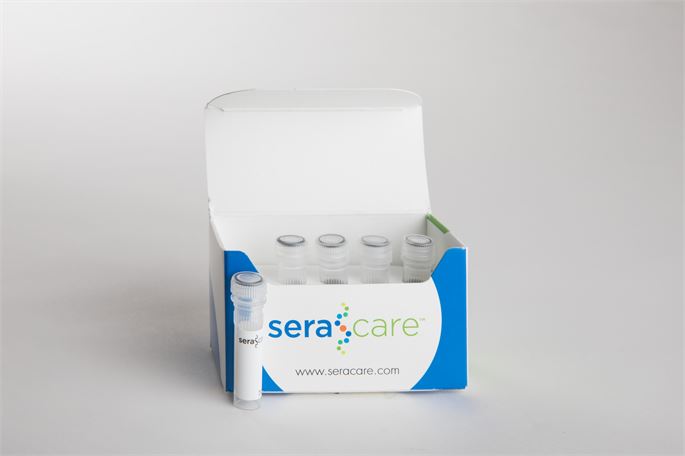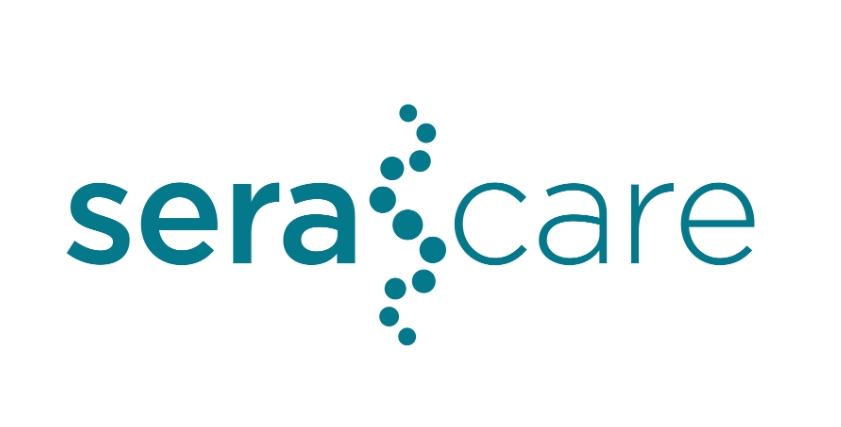


| 产品名称 | Seraseq® MSI Reference Panel Mix AF20% (SeraCare) |
|---|---|
| 目录号 | 0710-1676 |
| 别名 | N/A |
| 外观 | N/A |
| 分子量 | N/A |
| CAS | N/A |
| 溶解度 | N/A |
| 存储条件 | N/A |
| 保存时间 | N/A |
| 备注1 | N/A |
| 备注2 | N/A |
| 目录号 | 规格 | 价格 | 库存状态 | |
| 0710-1676 | 2 x 15 µl | 咨询客服 | 咨询客服 |
品名:Seraseq® MSI Reference Panel Mix AF20%
货号:0710-1676
品牌:SeraCare
Product Specifications
# of variants 5
Allele Frequency 20%
Concentration 20 ng/µL
Fill Size 15 µl
Total DNA 300 ng
Number of vials 2 (tumor-normal matched)
Matrix TE Buffer
Marker Gene Chromosome Position (hg19 based) Comment
BAT-25 KIT (intron16) chr4 55598211 25T->19T
BAT-26 MSH2 (intron5) chr2 47641559 27A -> 17A
NR-21 SLC7A8 (5’UTR) chr14 23652346 21A -> 13A
NR-24 ZNF2 (3’UTR) chr2 95849361 23T -> 17T
MONO-271 MAP4K3 (intron 3) chr2 39573062 27A -> 21A
MONO-271 MAP4K3 (intron13) chr2 39536690 27A -> 21A
1There is ambiguity in the literature on the MONO-27 locus so two constructs are included in the product to ensure
compatibility (see Bacher J, Halberg R, Kent-First M, Wood KV. “Methods and kits for detecting mutations”
US Patent US20090068646A1 issued March 12, 2009; and Pino MS, Chung DC. “Application of molecular diagnostics
for the detection of Lynch syndrome.” Expert review of molecular diagnostics vol. 10,5 (2010): 651-65. doi:10.1586
/erm.10.45).
Details
Microsatellites are regions of DNA repeats with different lengths, i.e., instability, highlighting DNA mismatch repair
gene deficiencies. Typical lengths for these DNA repeats are between 1-6 base pairs and vary person to person
such that each person has a set length of these microsatellites in their genome. Measurements of MSI have
traditionally been performed using qPCR/CE analysis methods, but new methodologies are now available that
includes digital droplet PCR (ddPCR) as well as Next Generation Sequencing (NGS). Microsatellite instability status has
been linked to favorable outcomes in I-O treatment response by patients with diseases such as Lynch Syndrome and
colorectal cancer. Hence MSI measurements have become an important biomarker in immuno-oncology therapeutics.
LGC SeraCare has developed microsatellite instability (MSI) reference materials containing the key mono- and
dinucleotide biomarkers typically analyzed in molecular MSI assays – NR-21, NR-24, BAT-25, BAT-26 and MONO-27.
These markers are blended at two different allele frequency levels – AF5% and AF20% - to support MSI assay LoD
determinations and accurate MSI detection. These products are offered as tumor-normal matched pairs, with variants
precisely quantitated by digital PCR as well as qPCR/CE against a highly characterized genomic DNA from a
background WT cell line (GM24385) determined as microsatellite stable (MSS).
FEATURES AND BENEFITS
Plasmid-based spike-ins of 5 key MSI biomarkers typically analyzed in molecular assays that measure MSI in
cancer patent samples
Offered as tumor-normal matched pairs per AF level
Each biomarker blended at two AF levels – 5% and 20% - to support assay LoD determinations and accurate MSI
detection in patient samples
Variant AFs quantitated by ddPCR and qPCR assays
Normal background DNA is a highly characterized GM24385 human genomic DNA known to be microsatellite
stable (MSS)
Manufactured within cGMP compliant and ISO 13485 certified facilities

维百奥生物代理SeraCare对照及参比物质。
维百奥(北京)生物科技有限公司,自2018年与SeraCare(现隶属于LGC Clinical Diagnostics)合作以来,长期为中国客户
提供包括SeraSeq系列参比物质,领域包括肿瘤、生殖健康和遗传病。SeraCare研发和生产一系列临床参比物质,可以用于任何
研发阶段,以确保临床基因组学检测结果的准确性。
SeraCare参比物质涵盖的范围:
1)Next Generation Sequencing
2)Sanger Sequencing
3)Real-time PCR and digital PCR (dPCR)
4)Microarray
主要特点
1)Ready-to-use reference materials covering clinically-relevant variants and all variant types - SNVs, INDELS, CNVs,
and RNA fusions
2)Highly multiplexed - provide significantly more data per NGS run, saving sequencing costs
3)Available in multiple formats to suite different workflow needs - purified DNA & RNA, ctDNA, encapsulated ctDNA
in plasma, and FFPE
4)Manufactured in cGMP-compliant, ISO 13485-certified facilities
5)Stringent product release testing - all variants qualified by dPCR for allele frequencies or copy numbers